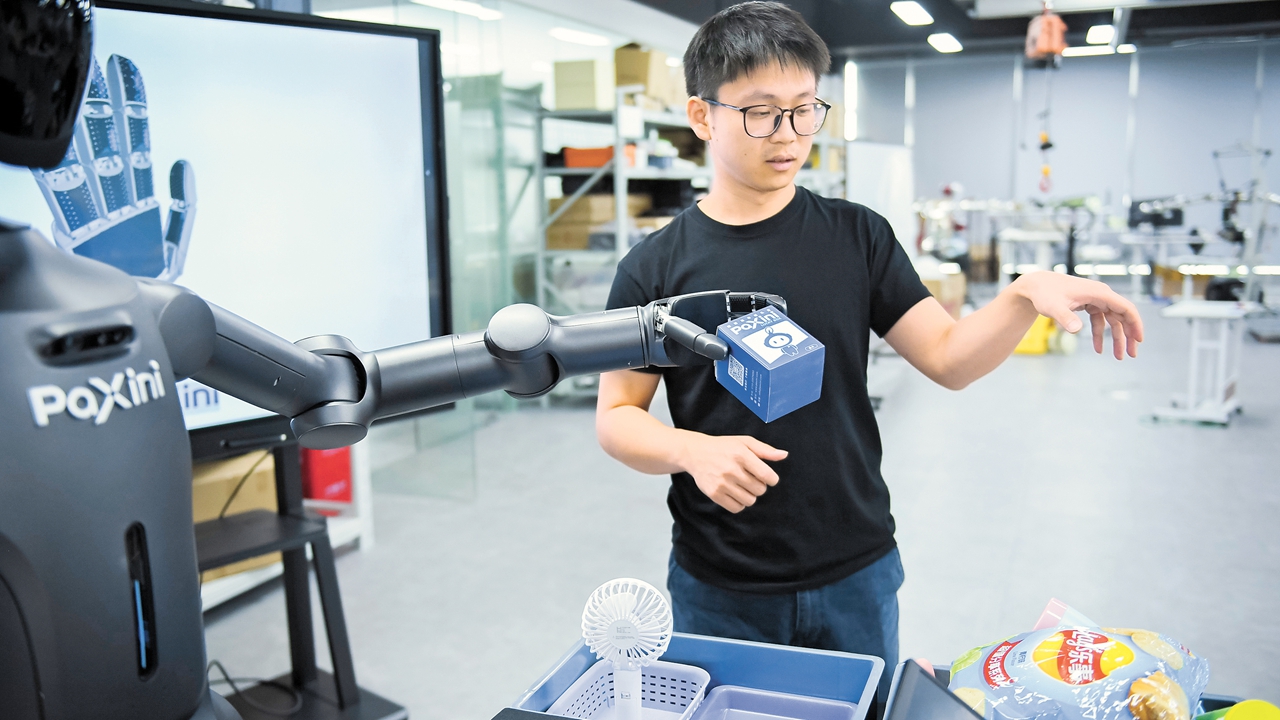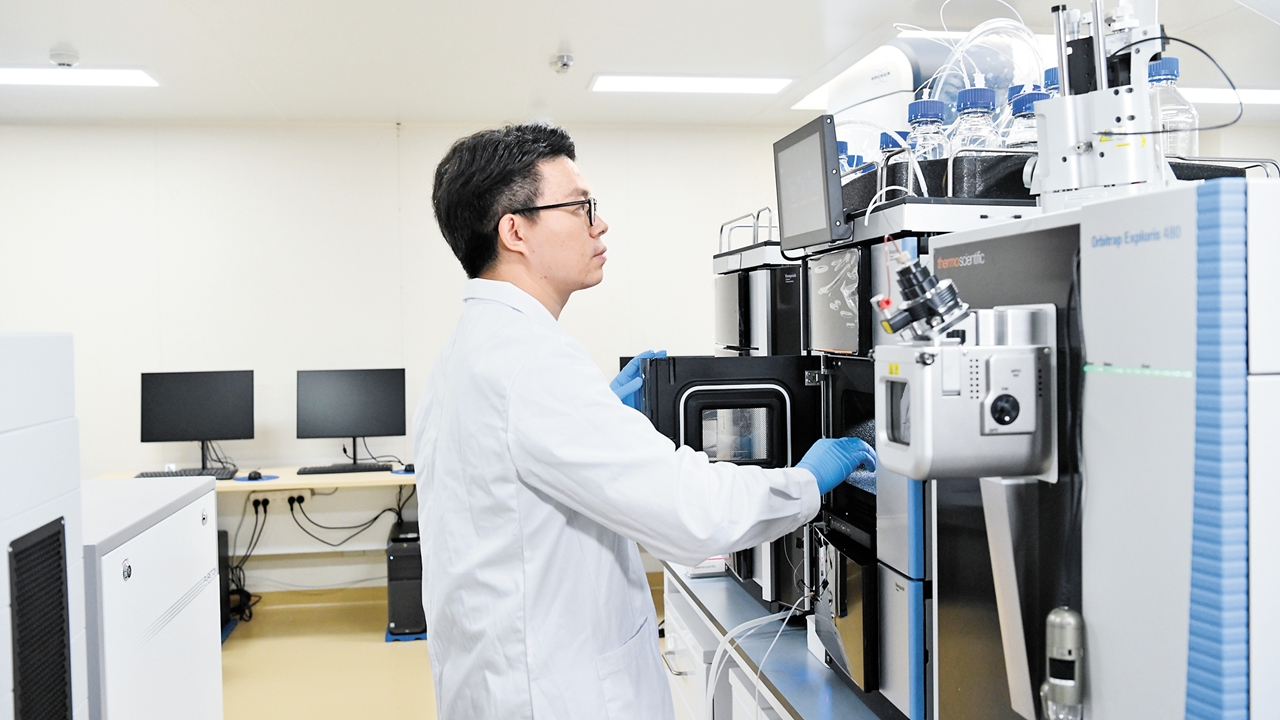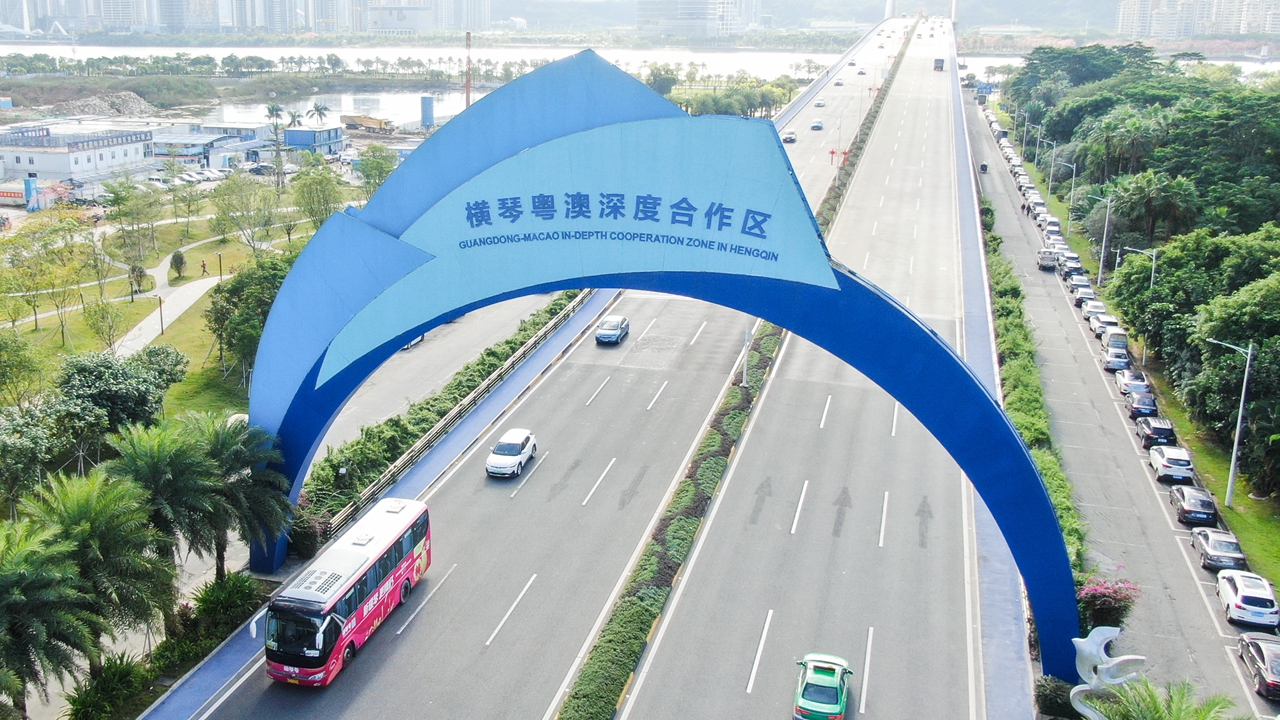GBA in high gear for new quality productive forces
Writer: | Editor: Lin Qiuying | From: | Updated: 2024-12-26
BYD, a front-runner in the global new energy vehicle (NEV) market, set a new record this October, achieving sales of 500,000 NEVs in a single month. In the first 11 months of 2024, BYD sold 3.75 million vehicles, over 40% more than the same period in the previous year.
The NEV sector is the epitome of the rapid development of strategic industries in the Guangdong-Hong Kong-Macao Greater Bay Area (GBA), where BYD was born.
 Visitors gather at BYD's booth at the 18th Beijing International Auto Show in Beijing in this May 4 photo. Photos from Xinhua
Visitors gather at BYD's booth at the 18th Beijing International Auto Show in Beijing in this May 4 photo. Photos from Xinhua
Covering an area of 56,000 square kilometers, which is less than 0.6% of the country’s total land area, the GBA generated an economic output exceeding 14 trillion yuan (US$1.95 trillion) in 2023, roughly one-ninth of the national total.
The GBA is one of China’s most open and economically dynamic areas and is also among the regions with the highest economic development quality.
Pacesetter in high-quality growth
Eyeing high-quality sustainable development, Guangdong Province has recently outlined action plans for 20 strategic industry clusters, including the automotive industry, new-generation electronic information technology, green petrochemicals, intelligent home appliances, and advanced materials.
Statistics reveal that in 2023, the 20 strategic industry clusters in Guangdong saw a 5.2% year-on-year increase in value-added, contributing to 40% of the province’s total GDP.

An employee tests the flexibility of a humanoid robot's fingers at the laboratory of Paxini Tech in Shenzhen's Bao'an District in this June 28 photo.
Among them, the three mainstay industries — computers, communications, and other electronic equipment manufacturing; electrical machinery and equipment manufacturing; and the automotive manufacturing industry — saw value-added growth rates of 3.6%, 8.8%, and 11.2%, respectively. These industries serve as the “stabilizers” of Guangdong’s manufacturing sector.

A Shenzhen Eastern General Aviation Co. helicopter prepares to land atop a building in Shenzhen's Futian CBD area in this March 18 photo.
In particular, Shenzhen, a pioneer in China’s reform and opening-up drive, has established specialized teams to aggregate expertise in three key industries — pharmaceuticals and medical devices, NEVs, and artificial intelligence (AI). These initiatives aim to further promote the development of these industries, cultivate more new pillars, and stimulate stronger new dynamics.
Huang Ming, an official with Shenzhen’s Industry and Information Technology Bureau, stated that Shenzhen is capitalizing on the historic shift in the global automotive industry. The city is strategically aiming to expedite the growth of a “world-class, next-generation automotive hub.”
“Without the strong support of the Guangdong provincial authorities and Shenzhen authorities, there would be no BYD as it is today,” said Wang Chuanfu, chairman and president of BYD.
Innovation-driven
This year marks the fifth anniversary of the release of the Outline Development Plan for the GBA.
From reform and opening-up to new quality productive forces, the success of the GBA’s economic miracle has been a testament to how innovation drives growth.

A researcher works in the brain analysis and brain simulation lab at Guangming Science City in Shenzhen's Guangming District in this Nov. 27 photo.
Science and technology constitute a primary productive force. To get prepared for future industries, the GBA has established two national laboratories, 30 national key laboratories, and 430 provincial key laboratories, forming a tiered, diverse, and distinctive laboratory system that serves as a solid foundation for innovation, noted Gong Guoping, an official with Guangdong’s department of science and technology.
With consumer spending becoming a more significant driver of economic growth, the GBA is actively developing new consumption patterns. It is utilizing new technologies like big data, cloud computing, AI, the Internet of Things, and blockchain to enhance consumer experiences, stimulate cross-border consumption, and foster the integrated development of the region.
In the first half of 2024, a total of 44.66 million trips were made by Hong Kong residents to Shenzhen. Given that Hong Kong has a population of 7.5 million, this means on average, each Hong Kong resident traveled to Shenzhen six times.

The Guangdong-Macao In-depth Cooperation Zone in Zhuhai City's Hengqin area, which is located just across the river from Macao.
By September 2024, the Guangdong-Macao In-depth Cooperation Zone in Hengqin, located just across the river from Macao, had seen a total of 6,461 Macao-invested companies established. The number of Macao residents living in the zone had reached 16,539, marking a 19.1% increase year on year.
“The Greater Bay Area isn’t just about economic growth, it’s about connecting markets,” said Fu Tang Long, a Macao entrepreneur.
From flying taxis to streamlined multi-entry travel permits, the GBA continues to pioneer innovative initiatives, establishing a benchmark for robust regional economic integration.
Pro-business environment
Boosting global allure hinges on a business-friendly environment. In recent years, the GBA has striven to align with global benchmarks, fostering a market-oriented, law-based, and internationalized business environment.
Guangdong, for instance, has enacted a package of regulations to enhance the business environment, safeguard the interests of foreign investors, manage social credit, and protect intellectual property rights. These measures are instrumental in bolstering the GBA’s reform, innovation, and development efforts.
These efforts have yielded tangible results. This year’s Global Investment Promotion Conference for the GBA resulted in 1,933 projects with a combined investment totaling 2.26 trillion yuan.
Guangdong has been rated as the province with the best business environment reputation for four consecutive years, noted Zhu Yonghui with the GBA development office in Guangdong.
Zhu added that by aligning with international high-standard economic and trade rules and continuously deepening business environment reforms, the GBA is facilitating the convenient and efficient cross-border flow of people, goods, capital, and information and becoming “one of the most promising growth poles globally.” (Xinhua)